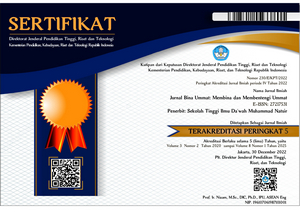SRATEGI KOMUNIKASI DA’WAH FORUM DA’WAH PERBATASAN (FDP) DALAM MEMBINA MUALAF DI PULAU BANYAK
DOI:
https://doi.org/10.38214/jurnaldawahstidnatsir.v6i1.160Keywords:
Communication Strategy, Muallaf, Knowing the audienceAbstract
Research purpose: The purpose of this research is to find out how the Communication Strategy of the Da'wah Border Da'wah Forum (FDP) in fostering the converts of Pulau Banyak community, Aceh Singkil Regency. In this study the authors used a qualitative method, and analyzed the data by using Anwar Arifin's theory. The results of the strategic research of the Border Da'wah Forum (FDP) include. 1). Knowing the audience by means of friendship, safari da'wah. 2). Compose messages by cadre da'i, and send da'i cadres to kepesanteren or kepondok. 3). Determining Methods by means of Persuasive Methods (Approaches), Educational Methods (Learning or Educating), Informative Methods (Providing Information), and Monitoring Methods (Evaluation).
Published
Versions
- 2025-01-08 (2)
- 2023-06-13 (1)
How to Cite
Issue
Section
Copyright (c) 2023 Jurnal Da'wah: Risalah Merintis, Da'wah Melanjutkan

This work is licensed under a Creative Commons Attribution 4.0 International License.
This work is licensed under a Lisensi Creative Commons Atribusi 4.0 Internasional.
Authors who publish with this journal agree to the following terms:
- Authors retain copyright and grant the journal right of first publication with the work simultaneously licensed under a Creative Commons Attribution License that allows others to share the work with an acknowledgment of the work's authorship and initial publication in this journal.
- Authors are able to enter into separate, additional contractual arrangements for the non-exclusive distribution of the journal's published version of the work (e.g., post it to an institutional repository or publish it in a book), with an acknowledgment of its initial publication in this journal.
- Authors are permitted and encouraged to post their work online (e.g., in institutional repositories or on their website) prior to and during the submission process, as it can lead to productive exchanges, as well as earlier and greater citation of published work (See The Effect of Open Access).




